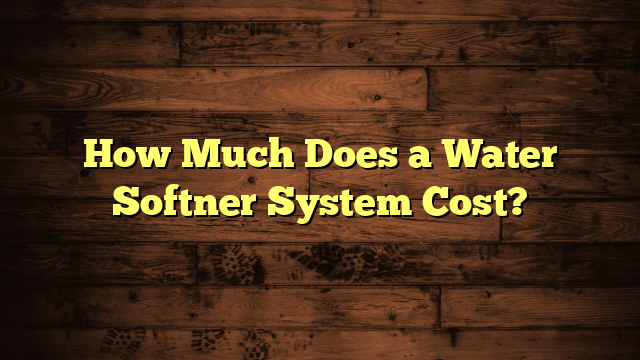What Size Water Softner to Choose?
Much like Goldilocks searching for the perfect bowl of porridge, finding the right size water softener for your home requires careful consideration. You need to assess your household's daily water usage and the hardness of your water to avoid a system that's either too small or unnecessarily large. A miscalculation can lead to unwanted consequences, affecting both efficiency and cost. So, how do you navigate these variables to guarantee you select a system that meets your needs without overspending?
Key Takeaways
- Determine your household's daily water usage to calculate the appropriate softener capacity needed for effective performance.
- Test your water hardness in grains per gallon (gpg) to ensure the softener can adequately address mineral levels.
- Factor in the number of occupants in your home, as larger families may require a softener with a higher capacity.
- Consider peak water usage times and future household growth when selecting the size of the water softener.
- Balance between insufficient and oversized units to avoid performance issues and unnecessary costs.
Understanding Water Hardness
When it comes to choosing the right water softener, understanding water hardness is essential. Water hardness refers to the concentration of minerals, particularly calcium and magnesium, present in your water supply. You can measure this hardness using a hardness scale, which typically categorizes water as soft, moderately hard, hard, or very hard.
Knowing where your water falls on this scale helps you determine the appropriate water softener. For example, if your water hardness is below 60 mg/L, it's considered soft, while hardness levels exceeding 180 mg/L classify the water as very hard. This distinction is vital since high hardness can lead to scale buildup in pipes, appliances, and fixtures, impacting their efficiency and lifespan.
To assess your specific water hardness, you can use a water testing kit or request a professional analysis. Once you know your hardness level, you can make informed decisions about the size and type of water softener needed to effectively remove excess minerals.
Adjusting your water hardness not only enhances the quality of your water but also prolongs the longevity of your plumbing systems and appliances.
Assessing Household Size
Understanding your water hardness is just the first step in selecting the right water softener; the next factor to evaluate is household size. Your household demographics and family lifestyle greatly influence the softener's capacity you need. A larger family or one with a high water consumption will require a more robust system to effectively manage water hardness.
Consider these key factors when evaluating your household size:
- Number of occupants: More people typically means more water usage.
- Daily routines: Activities such as laundry, dishwashing, and bathing can increase water demands.
- Appliance usage: Consider the number of water-using appliances, like washing machines and dishwashers, that may impact your overall consumption.
Estimating Water Usage
Estimating your household's water usage is vital for selecting the right water softener size. Start by analyzing your water consumption based on various activities, such as showering, washing dishes, laundry, and outdoor watering. You can review your water bill for average monthly usage, typically measured in gallons, to gain a clearer perspective.
Next, consider your household's usage patterns. For instance, if you have teenagers or frequent guests, your water consumption might spike during certain times. Furthermore, think about any changes you anticipate, like adding family members or increasing outdoor activities, which could affect your overall demand.
To get a more accurate estimate, calculate the daily water use per person in your home. The average individual consumes about 80-100 gallons per day. Multiply this figure by your household size and then adjust based on your unique habits and routines.
Finally, remember that water softeners are rated for specific capacities, so having an informed estimate of your water usage is essential. By understanding your water consumption and usage patterns, you'll be better equipped to choose a softener that meets your needs efficiently.
Evaluating Softener Capacity
Selecting the right capacity for your water softener is essential to guarantee peak performance and longevity. To achieve this, you'll need to conduct thorough capacity calculations based on your household's water usage and the hardness level of your water.
Consider these key factors in your evaluation:
- Daily Water Consumption: Calculate how much water your household uses daily.
- Water Hardness: Test your water to determine its hardness level, measured in grains per gallon (gpg).
- Softeners Efficiency: Understand the efficiency of different softeners, which can affect how much capacity you'll need.
Once you have this information, apply these insights to select a model that meets your needs. A softener with insufficient capacity may lead to inadequate performance, causing you to face issues like scale buildup and decreased lifespan.
Conversely, an oversized unit could waste resources and increase costs unnecessarily. Striking the right balance guarantees that your water softener operates efficiently, providing you with ideal results while extending the lifespan of both the unit and your plumbing fixtures.
Make informed decisions by closely evaluating these critical factors for effective softener capacity planning.
Types of Water Softeners
Once you've assessed the capacity needs of your water softener, it's important to explore the various types available on the market. The two primary types are ion exchange water softeners and salt-free systems, each serving unique purposes.
| Type of Water Softener | Features |
|---|---|
| Ion Exchange | Uses salt to remove hard minerals, effectively softening water. Requires periodic salt replenishment. |
| Salt-Free | Utilizes a different technology to condition water without removing minerals. Maintains mineral content while preventing scale buildup. |
| Dual-Tank | Combines ion exchange and additional filtration. Offers continuous soft water supply, ideal for large households. |
| Magnetic | Uses magnetic fields to alter mineral structure, reducing scale without chemicals or salt. |
Ion exchange systems are highly efficient in softening water, providing immediate results. However, they require regular maintenance due to salt dependency. On the other hand, salt-free options are appealing for those looking to avoid salt usage, although they primarily focus on scale prevention rather than complete softening. Understanding these options will help you make an informed decision tailored to your water quality and usage needs.
Installation Considerations
When considering the installation of a water softener, several critical factors come into play that can greatly impact both performance and efficiency. First, you need to determine the ideal installation location. It should be close to the main water supply line and preferably in a space that remains above freezing temperatures.
Here are key considerations for your installation:
- Access to Drainage: Confirm you have a nearby drain for the brine discharge.
- Electrical Supply: Most softeners require a standard outlet for operation.
- Space: Make certain the area can accommodate the size of the unit you choose.
Next, focus on plumbing requirements. You may need to adapt existing plumbing to connect the softener properly. This often involves cutting into pipes and installing bypass valves for maintenance ease.
If you're not confident in your plumbing skills, hiring a professional can save you time and guarantee a proper setup.
Maintenance and Regeneration
Regular maintenance and regeneration are vital for ensuring your water softener operates efficiently and delivers peak performance. By following specific maintenance tips, you can extend the lifespan of your system and maintain ideal water quality.
First, check the salt level in the brine tank regularly. Ideally, you should keep the tank at least one-quarter full. Moreover, clean the brine tank and resin bed every six months to prevent sediment buildup.
Regeneration cycles are essential for removing accumulated hardness minerals from the resin beads. Depending on your water usage and hardness level, your softener may regenerate automatically or require manual initiation.
Here's a simple maintenance schedule for reference:
| Maintenance Task | Frequency | Notes |
|---|---|---|
| Check salt levels | Monthly | Keep at least ¼ full |
| Clean brine tank | Every 6 months | Prevent sediment buildup |
| Regeneration cycle | As needed/Monthly | Adjust based on water use |
Cost Factors in Selection
As you evaluate options for a water softener, understanding the cost factors involved is vital for making an informed decision. The initial purchase price is just one aspect; you'll also want to reflect on ongoing expenses that affect your budget.
Here are some key cost factors to keep in mind:
- Installation fees: Professional installation can add considerably to your initial costs.
- Salt and maintenance: Regular replenishment of salt and routine maintenance can influence your budget over time.
- Energy consumption: Some models use more energy than others, affecting your utility bills.
While you may face budget constraints upfront, it's important to think about long-term savings. A higher-quality water softener might require a larger investment initially but can lead to reduced energy costs and extended lifespan for plumbing and appliances.
Moreover, efficient systems can lower water usage and improve soap efficiency, ultimately saving you money on cleaning products.
Frequently Asked Questions
How Does Water Hardness Affect My Appliances' Lifespan?
Water hardness greatly impacts your appliances' lifespan. It creates water scale, reducing appliance efficiency and leading to costly repairs or replacements. Softening your water helps maintain ideal performance and prolongs the life of your appliances.
Can I Install a Water Softener Myself?
Installing a water softener yourself can feel like building a rocket ship, but it's doable. Just follow installation tips carefully and weigh DIY considerations like plumbing skills and tool availability to guarantee a successful project.
What Are the Signs My Water Softener Needs Maintenance?
When you're checking for maintenance signs, look for frequent regeneration cycles, decreased water softness, or unusual noises. These indicators suggest your water softener needs attention to guarantee peak performance and longevity. Don't ignore them.
Is There a Difference Between Salt-Based and Salt-Free Softeners?
Yes, there's a difference. Salt-based softeners excel in reducing hardness, offering significant benefits like improved lathering. In contrast, salt-free systems provide effectiveness by conditioning water but don't remove minerals, making them less effective for severe hardness issues.
How Long Does a Water Softener Usually Last?
A water softener's lifespan typically ranges from 10 to 20 years, depending on usage and maintenance schedule. Regular checks and timely repairs can considerably enhance your system's longevity, ensuring ideal performance throughout its lifetime.
Conclusion
Choosing the right size water softener isn't just important—it's absolutely vital for your home's plumbing health. By understanding water hardness, evaluating your household size, and estimating your water usage, you can pinpoint the ideal softener capacity. Remember, an oversized unit can waste water like it's going out of style! Keep in mind installation, maintenance, and cost factors to guarantee your investment pays off. With the right softener, you'll enjoy cleaner, softer water for years to come.







